310th Space Wing
The 310th Space Wing is an Air Reserve Component (ARC) of the United States Air Force. It is assigned to the Tenth Air Force, Air Force Reserve Command, stationed at Schriever Air Force Base, Colorado.
| 310th Space Wing | |
|---|---|
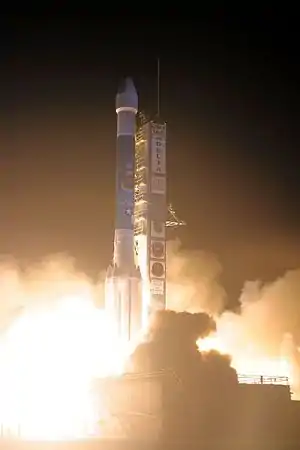 A United Launch Alliance Delta II rocket blasts off with the Air Force’s Global Positioning System IIR-21 satellite from Space Launch Complex-17A | |
| Active | 1942–1945; 1946–1949; 1952–1965; 1991–1993; 1997–present |
| Country | |
| Branch | |
| Type | Wing |
| Role | Space Operations |
| Part of | |
| Garrison/HQ | Schriever Air Force Base, Colorado |
| Engagements | European-African-Middle Eastern Theater |
| Insignia | |
| 310th Space Wing emblem (Modified 26 December 2000)[1] | 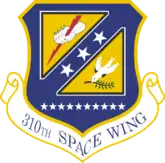 |
| 310th Bombardment Wing emblem (Original form, approved 7 January 1954)[2] | 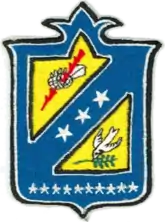 |
The 310th SW is mission partnered with the United States Space Force's 21st Space Wing, 30th Space Wing, and 460th Space Wing.
Overview
The 310 SW is the only space wing in the Air Force Reserve. It provides specialized expertise, continuity and combat ready personnel, projecting space power for U.S. interests worldwide.
The 310th has a long and rich heritage dating back to World War II, when it began as the 310th Bombardment Group on 15 March 1942, flying North American B-25 Mitchell medium bombers. In October 1942, the 310th was the first 12th Air Force group sent overseas, initially to England and then to French Morocco, Algeria, Tunisia, France, and Italy where the highly decorated unit participated in the European-African-Middle Eastern Campaign.[3] The 310th Bombardment Group was inactivated in September 1945.
The 310th Bombardment Wing was reactivated in 1952 as part of Strategic Air Command. It trained on the Boeing B-29 Superfortress before converting to the Boeing B-47 Stratojet. It was inactivated in June 1965 with the phaseout of the B-47 from the U.S. Air Force inventory.
The 310th became part of Air Force Space Command in 1991 when the 310th Training and Test Wing was activated for a short time at Vandenberg Air Force Base, Calif.; the 310th designator was again activated with the stand up of the 310th Space Group on 4 September 1997. The 310th Space Group was re-designated the 310th Space Wing on 7 March 2008.
The 310th Space Wing is commanded by Colonel Traci L. Kueker-Murphy. Its Command Chief Master Sergeant is Chief Master Sergeant Imelda B. Johnson.[4]
Subordinate units
The wing is composed of the 310th Operations Group, 710th Operations Group, and 310th Mission Support Group, that support various military and other government organizations including, but not limited to, the Department of Commerce, United States Space Force, Space Operations Command, 50th Space Wing, 21st Space Wing, and 460th Space Wing.
- 310th Operations Group
- 6th Space Operations Squadron (Defense Meteorological Satellite Program backup for NOAA)
- 7th Space Operations Squadron (associate unit to 1st Space Operations Squadron)
- 9th Combat Operations Squadron (supports the Fourteenth Air Force Joint Space Operations Center at Vandenberg Air Force Base)
- 19th Space Operations Squadron (associate unit to 2 SOPS)
- 310th Operations Support Squadron (provides operations support and applicable program oversight to the space operations squadrons)
- 710th Operations Group
- 380th Space Control Squadron (associate unit to 16th Space Control Squadron at Peterson Air Force Base)[5]
- 8th Space Warning Squadron (operates Space-Based Infrared System at Buckley Air Force Base)
- Detachment 1 8th Space Warning Squadron
- 310th Mission Support Group
- 310th Security Forces Squadron
- 710th Security Forces Squadron
- 310th Force Support Squadron
- 310th Communications Flight (associate unit to 561st Network Operations Squadron (INOSC West) at Peterson Air Force Base)[6]
- Reserve National Security Space Institute (associate unit to the NSSI)
History
World War II
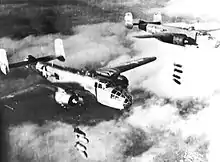
The unit was constituted as the 310th Bombardment Group (Medium) on 28 January 1942 and activated on 15 March 1942. Used B-25s in preparing for duty overseas.
Moved to the Mediterranean theater by single aircraft between October 1942 and March 1943 and assigned to Twelfth Air Force. Sufficient aircraft were on hand by 2 December, when it conducted its first operation against antiaircraft concentrations at Gabes, Tunisia. Engaged primarily in support and interdictory operations in Tunisia, Sicily, Italy, Corsica, Sardinia, and southern France. The 310th Bomb Group also flew some missions to Austria and Yugoslavia.
The unit attacked harbors and shipping to help defeat Axis forces in North Africa, December 1942 – May 1943. Bombed airdromes, landing grounds, and gun emplacements on Pantelleria, Lampedusa, and Sicily, May–July 1943. The unit supported the Allied landing at Salerno, September 1943. Assisted the drive toward Rome, January–June 1944.
Supported the invasion of Southern France, August 1944. Struck German communications— bridges, rail lines, marshalling yards, viaducts, tunnels, and road junctions in Italy, August 1943 – April 1945. Also dropped propaganda leaflets behind enemy lines.
The 310th Bomb Group received a Distinguished Unit Citation for a mission to Italy on 27 August 1943 when, in spite of persistent attacks by enemy interceptors and antiaircraft artillery, the group effectively bombed marshalling yards at Benevento and also destroyed a number of enemy planes. Received second DUC for another mission in Italy on 10 March 1945 when the group, maintaining a compact formation in the face of severe antiaircraft fire, bombed the railroad bridge at Ora, a vital link in the German supply line.
The 310th Bomb Group was inactivated in Italy on 12 September 1945.
The unit was redesignated the 310th Bombardment Group, Light and allotted to the reserve. Activated in the US on 27 December 1946. Inactivated on 27 June 1949.
Cold War
The 310th Bombardment Wing was activated in 1952 as a Strategic Air Command unit, receiving Boeing B-29 Superfortress bombardment training from 90th Bombardment Wing, April–August 1952. From February through May 1953, the 310th Bomb Wing provided bombardment training to the 40th Bombardment Wing.
Replaced the propeller-driven B-29s with new Boeing B-47E Stratojet swept-wing medium bombers in 1954, capable of flying at high subsonic speeds and primarily designed for penetrating the airspace of the Soviet Union. Participated in SAC REFLEX deployments, deploying to RAF Upper Heyford, England, 10 March – 8 June 1955, and at RAF Greenham Common, England, 3 October 1956 – 9 January 1957.
The wing gained a strategic missile squadron in April 1961. First CGM-16 Atlas missiles went on alert in September 1962. In the early 1960s, the B-47 was considered to be reaching obsolescence, and was being phased out of SAC's strategic arsenal. B-47s began being sent to AMARC at Davis–Monthan in early 1965; was inactivated in late June.
Air Force Space Command
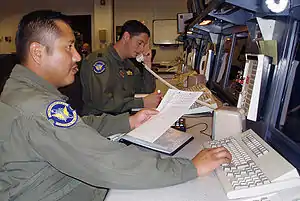
On 1 September 1991, the third wing to hold the "310" designation, the 310th Training and Test Wing (310 TTW), assumed the ICBM testing and training mission from the Strategic Missile Center at Vandenberg AFB, California under the Twentieth Air Force. After removal of ICBMs from alert status at the end of the Cold War, the 310 TTW continued to train Minuteman crews and to test accuracy and reliability of Minuteman and Peacekeeper missiles. The 310 TTW also assisted in testing the Global Positioning System (GPS) April 1992 – May 1992. It was reassigned to Air Combat Command on 31 May 1992. It was inactivated on 1 July 1993.
The 310th designator was again activated with the stand up of the 310th Space Group 4 September 1997. The group was created around its original squadron, the 7th SOPS, and has grown rapidly with the realization of the critical role the Air Force Reserve can play in the future of space operations. The group has been tremendously successful in its initial missions and has been tasked with reviewing future active/Reserve partnerships in space to identify potential areas where the AF Reserve can add value in the space arena.
Air Force Reserve Command officials are expanding the role reservists play in space operations by establishing AFRC's first space wing at Schriever Air Force Base. Command officials activated the 310th Space Wing on 7 March 2008.[7]
Lineage
- 310th Bombardment Group
- Established as the 310th Bombardment Group (Medium) on 28 January 1942
- Activated on 15 March 1942
- Redesignated 310th Bombardment Group, Medium on 20 August 1943
- Inactivated on 12 September 1945
- Redesignated 310th Bombardment Group, Light and activated in the reserve on 27 December 1946.
- Inactivated on 27 June 1949
- Consolidated with the 310th Strategic Aerospace Wing as the 310th Strategic Aerospace Wing on 31 January 1984[1]
- 310th Space Wing
- Established as the 310th Bombardment Wing, Medium on 15 March 1952
- Activated on 28 March 1952
- Redesignated 310th Strategic Aerospace Wing on 1 March 1962
- Discontinued and inactivated on 25 June 1965
- Consolidated with the 310th Bombardment Group on 31 January 1984 (remained inactive)
- Redesignated 310th Training and Test Wing on 29 August 1991
- Activated on 1 September 1991
- Inactivated on 1 July 1993
- Redesignated 310th Space Group on 22 August 1997
- Activated in the reserve on 1 September 1997
- Redesignated 310th Space Wing on 7 March 2008[1]
Assignments
|
|
Stations
|
|
Components
Wings
- 40th Bombardment Wing: attached 6 February – 1 May 1953[1]
Groups
- 310th Operations Group: 1 September 1991 – 1 July 1993,[1] 7 March 2008 – present
Squadrons
|
|
Aircraft, Missiles, and Satellites Operated
- North American B-25 Mitchell, (1942–1945)
- Boeing B-29 Superfortress (1952–1954)
- Boeing KC-97 Stratotanker (1952–1963)
- Boeing B-47 Stratojet (1954–1965)
- CGM-16 Atlas (1962–1965)
- Boeing KC-135 Stratotanker (1964–1965)
- Defense Meteorological Satellite Program (1997–present)
- Global Positioning System (1997–present)
- Space-Based Infrared System (2006–present)
List of commanders
| No. | Commander | Term | |||
|---|---|---|---|---|---|
| Portrait | Name | Took office | Left office | Term length | |
| 1 | Colonel Jeffrey Ansted[9] | 7 January 2006 | October 2008 | ~2 years, 268 days | |
| 2 | Colonel Karen A. Rizzuti | October 2008 | 9 January 2011 | ~2 years, 100 days | |
| 3 | Colonel Jeffrey T. Mineo[11] | 9 January 2011 | 12 July 2014 | 3 years, 184 days | |
| 4 | Colonel Damon S. Feltman[13] | 12 July 2014 | 17 September 2016 | 2 years, 67 days | |
| 5 | Colonel Traci L. Kueker-Murphy[15] | 17 September 2016 | 3 November 2018 | 2 years, 47 days | |
| 6 | Colonel Dean D. Sniegowski[17] | 3 November 2018 | 31 July 2020 | 1 year, 271 days | |
| 7 | Colonel Shariful M. Khan[19] | 31 July 2020 | Incumbent | 170 days | |
See also
- List of B-29 Superfortress operators
- List of B-47 units of the United States Air Force
- 521st Air Service Group Support unit for the group in World War II
References
Notes
- Kane, Robert B. (23 December 2010). "Factsheet 310 Space Wing (AFRC)". Air Force Historical Research Agency. Retrieved 14 May 2016.
- Maurer, Combat Units, pp. 184–186
- Story of the 12th Air Force
- "310th Space Wing Biographies". 310th Space Wing. Retrieved 19 December 2016.
- Fixemer, Joseph (18 September 2008). "380th BS re-activated for space duty". 380th Space Control Squadron. Retrieved 19 December 2016.
- Campbell, Patrick (8 April 2010). "Cyberspace exercise prepares 67th NWW for Guardian Challenge". 67th Network Warfare Wing. Retrieved 19 December 2016.
- White, Ed (7 March 2008). "310th Space Wing activates, kicking off with an Air Force first". Air Force Space Command Public Affairs. Retrieved 19 December 2016.
- https://www.afspc.af.mil/News/Article-Display/Article/251939/310th-sg-changes-commanders/
- https://www.afspc.af.mil/News/Article-Display/Article/251939/310th-sg-changes-commanders/
- https://www.310sw.afrc.af.mil/News/Article-Display/Article/453786/mineo-takes-reins-at-310th-space-wing/
- https://www.310sw.afrc.af.mil/News/Article-Display/Article/453786/mineo-takes-reins-at-310th-space-wing/
- https://www.310sw.afrc.af.mil/News/Article-Display/Article/680796/310th-change-of-command-set-for-july-12/
- https://www.310sw.afrc.af.mil/News/Article-Display/Article/680796/310th-change-of-command-set-for-july-12/
- https://www.310sw.afrc.af.mil/News/Article-Display/Article/947872/kueker-murphy-takes-command-of-310th-space-wing/
- https://www.310sw.afrc.af.mil/News/Article-Display/Article/947872/kueker-murphy-takes-command-of-310th-space-wing/
- https://www.310sw.afrc.af.mil/News/Article-Display/Article/1685368/col-dean-sniegowski-takes-command-of-310th-space-wing/
- https://www.310sw.afrc.af.mil/News/Article-Display/Article/1685368/col-dean-sniegowski-takes-command-of-310th-space-wing/
- https://www.310sw.afrc.af.mil/News/Article-Display/Article/2301415/310th-space-wing-gets-new-commander/
- https://www.310sw.afrc.af.mil/News/Article-Display/Article/2301415/310th-space-wing-gets-new-commander/
Bibliography
![]() This article incorporates public domain material from the Air Force Historical Research Agency website http://www.afhra.af.mil/.
This article incorporates public domain material from the Air Force Historical Research Agency website http://www.afhra.af.mil/.
- Maurer, Maurer, ed. (1983) [1961]. Air Force Combat Units of World War II (PDF) (reprint ed.). Washington, DC: Office of Air Force History. ISBN 0-912799-02-1. LCCN 61060979.
- Maurer, Maurer, ed. (1982) [1969]. Combat Squadrons of the Air Force, World War II (PDF) (reprint ed.). Washington, DC: Office of Air Force History. ISBN 0-405-12194-6. LCCN 70605402. OCLC 72556.
- Ravenstein, Charles A. (1984). Air Force Combat Wings, Lineage & Honors Histories 1947–1977. Washington, DC: Office of Air Force History. ISBN 0-912799-12-9.
- 310th Space Wing Factsheet

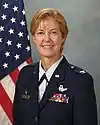
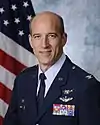
.jpg.webp)
.jpg.webp)
.jpg.webp)
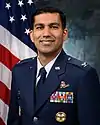
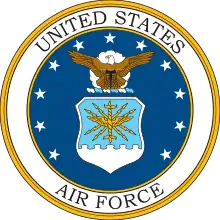

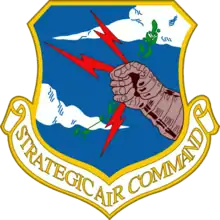
.svg.png.webp)